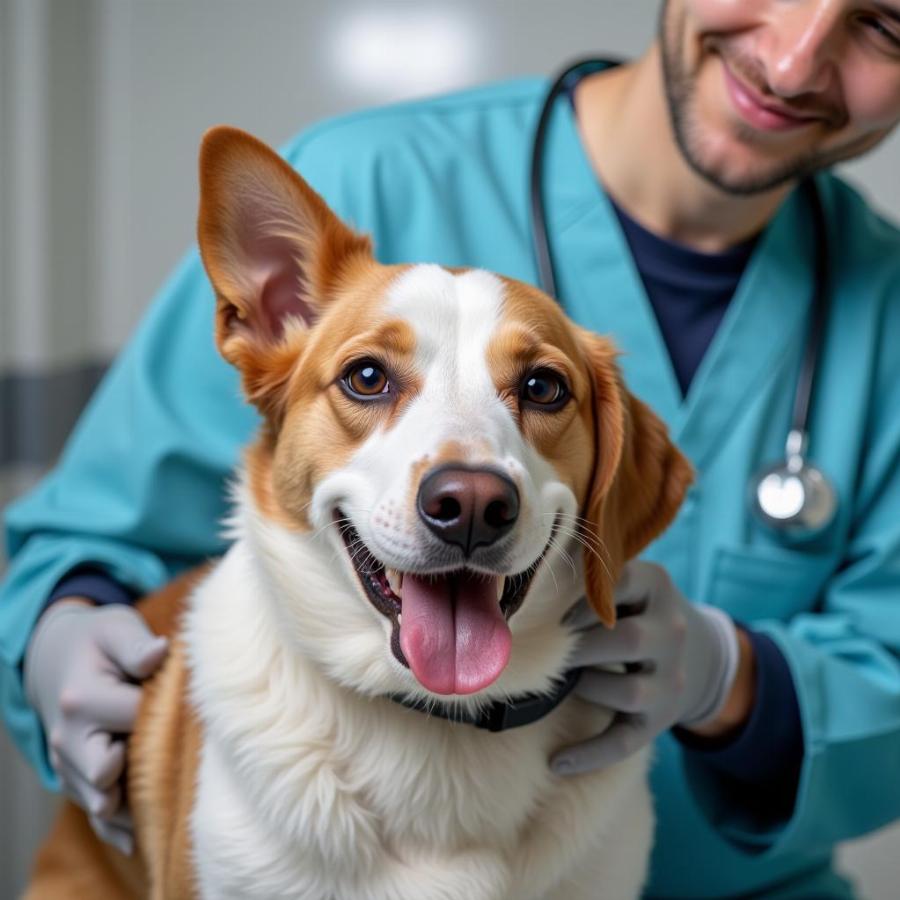If your dog is acting strange, you’re likely worried and searching for answers. Changes in behavior can be subtle or dramatic, ranging from unusual quietness to sudden aggression. Understanding why your furry friend is acting differently is crucial for their well-being and your peace of mind. This comprehensive guide will help you decipher your dog’s unusual behavior, identify potential causes, and determine the best course of action.
Recognizing Strange Behavior in Dogs
What constitutes “strange” behavior varies from dog to dog. It’s essential to know your dog’s typical personality and habits. A normally energetic dog suddenly becoming lethargic, or a shy dog exhibiting aggression, are red flags. Other signs include changes in eating habits, sleeping patterns, vocalizations, posture, and social interactions. Are they hiding more? Are they excessively licking or scratching? Even seemingly minor changes can indicate underlying issues.
Possible Reasons Why My Dog Is Acting Strange
Several factors can contribute to changes in a dog’s behavior. Some common causes include:
- Medical Issues: Illness or injury can significantly impact behavior. Pain, discomfort, or changes in sensory perception can lead to withdrawal, aggression, or other unusual actions.
- Environmental Changes: Moving to a new home, the introduction of a new pet or family member, or even changes in routine can stress a dog, causing them to act differently.
- Emotional Distress: Dogs experience emotions like fear, anxiety, and depression, which can manifest in behavioral changes. Loud noises, separation from their owners, or traumatic experiences can trigger emotional distress.
- Cognitive Decline: Senior dogs can experience cognitive dysfunction syndrome, similar to dementia in humans, leading to confusion, disorientation, and changes in behavior.
What to Do If Your Dog Is Acting Strange
If you notice persistent changes in your dog’s behavior, it’s essential to take action.
- Observe and Document: Carefully note the specific changes you’ve observed, including when they started and how frequently they occur. This information will be valuable for your veterinarian.
- Consult Your Veterinarian: A veterinary examination is crucial to rule out any underlying medical conditions. my dog is acting strange and shaking may indicate a neurological problem, while my dog acting strange hiding could be a sign of fear or pain.
- Environmental Enrichment: Ensure your dog’s environment is stimulating and enriching. Provide plenty of opportunities for exercise, playtime, and mental stimulation.
 Dog at the Vet Checkup
Dog at the Vet Checkup
Why is my dog acting strange all of a sudden?
Sudden behavioral changes warrant immediate attention. This could be due to poisoning, injury, or a sudden onset of illness. Contact your veterinarian immediately.
My dog is hiding and acting strange. Should I be worried?
Hiding behavior, coupled with other unusual actions, can indicate fear, pain, or illness. It’s crucial to consult a vet to determine the underlying cause. my dog is hiding and acting strange can be a serious concern.
Is my dog’s strange behavior a sign of aging?
While some behavioral changes can be attributed to aging, it’s essential to differentiate between normal age-related changes and signs of illness or cognitive decline. why is my dog acting strange has many possible answers.
Expert Insights
- Dr. Emily Carter, DVM: “Changes in behavior are often the first sign of illness in dogs. Don’t hesitate to seek veterinary care if you notice anything unusual.”
- Dr. John Miller, Certified Dog Trainer: “Environmental enrichment and consistent training can significantly improve a dog’s behavior and overall well-being. 10 reasons why dogs follow you to the bathroom can be surprisingly related to their social needs and pack instincts, for instance.”
Conclusion
Addressing changes in your dog’s behavior promptly is essential for their health and happiness. By understanding the potential causes and seeking professional guidance, you can ensure your furry friend receives the necessary care and support. Don’t dismiss “my dog is acting strange” as a passing phase. It could be a vital clue to their overall well-being.
FAQ
- Q: How can I tell if my dog’s strange behavior is serious? A: Any persistent or sudden changes in behavior should be evaluated by a veterinarian.
- Q: Can stress cause my dog to act strangely? A: Yes, stress can significantly impact a dog’s behavior.
- Q: What are some signs of cognitive dysfunction in dogs? A: Signs include disorientation, changes in sleeping patterns, house soiling, and altered social interactions.
- Q: Should I try to train my dog out of strange behavior? A: Addressing underlying medical or emotional issues is crucial before attempting behavioral modification.
- Q: When should I take my dog to the emergency vet for strange behavior? A: Sudden onset of aggression, seizures, difficulty breathing, or collapse require immediate veterinary attention.
- Q: How can I help my dog cope with environmental changes? A: Maintaining a consistent routine, providing a safe space, and using positive reinforcement can help ease your dog’s transition.
- Q: What if my vet can’t find anything medically wrong with my dog? A: Consider consulting a certified dog trainer or veterinary behaviorist for further evaluation and guidance.